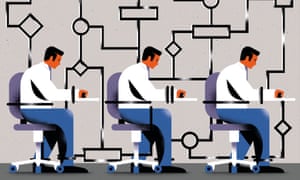Many jobs in the modern economy have been sapped of their humanity. How should we resist the rise of ‘digital Taylorism’?

Most of the headlines about technology in the workplace relate to robots rendering people unemployed. But what if this threat is distracting us from another of the distorting effects of automation? To what extent are we being turned into workers that resemble robots?
Take taxi drivers. The prevailing wisdom is they will be replaced by Uber drivers, who in turn will ultimately be replaced by self-driving cars. Those lauding Transport for London’s refusal to renew Uber’s licence might like to consider how, long before that company “disrupted” the industry, turn-by-turn GPS route management and dispatch control systems were de-skilling taxi drivers: instead of building up navigational knowledge, they increasingly rely on satnavs.
Continue reading and discover that Taylorism is nothing to do with Matthew Taylor or his review of the gig economy but Frank Taylor, long deceased, who developed time and motion studies for his workforce, breaking the work down into the smallest possible tasks. A management system that is still in operation in many places.
No comments:
Post a Comment